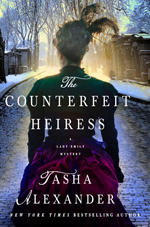My (Fictional) Home
I learned to be a serious novelist when I moved to Tennessee
When I was a child in South Bend, Indiana, my St. Louis-born mother often reminded me about the Southern roots of our family, but it was not until I moved to Franklin, Tennessee, that I truly began to understand the South. After graduating from the University of Notre Dame, I moved a lot—about a dozen times in fifteen years. So, yes, if you ever need advice on packing or unpacking, you know where to come: I went from Indiana to New Jersey, and then on to Wyoming, Vermont, Connecticut, and Tennessee, before settling in Chicago. (I have no plans to relocate at the moment, which is good as I now own so many books I’m not sure there is a truck big enough to hold them all.) Each of these places etched themselves on my psyche, but Tennessee, with its fruit tea, tangy barbeque, and hot chicken, was the place where I learned to be a writer.
 I wrote my first novel, And Only to Deceive, in New Haven, Connecticut, ensconced in a cozy attic apartment originally designed to house the servants who worked on the floors below. It felt like hubris even to attempt to write a book, but I had spent so many years saying I wanted to write that the time had come to sit down and do it or stop claiming it as a goal. A first book is like none of the others an author writes. There is no pressure, no deadline, no voices in your head (readers, agent, editor, reviewers) whispering suggestions. Most important, there are no expectations.
I wrote my first novel, And Only to Deceive, in New Haven, Connecticut, ensconced in a cozy attic apartment originally designed to house the servants who worked on the floors below. It felt like hubris even to attempt to write a book, but I had spent so many years saying I wanted to write that the time had come to sit down and do it or stop claiming it as a goal. A first book is like none of the others an author writes. There is no pressure, no deadline, no voices in your head (readers, agent, editor, reviewers) whispering suggestions. Most important, there are no expectations.
I moved to Tennessee after my agent sold that first book to William Morrow/HarperCollins but before it was published, and I will always be grateful for this timing because I cannot imagine a place better suited to easing the transition from aspiring writer to professional novelist. Soon after arriving in Nashville, I got my first hints of just how different life in the South is from life pretty much everywhere else.
 I spent close to six months in a tiny, furnished apartment near Music Row, waiting for our house to be completed in Franklin. My son was in kindergarten, and every day I drove him to what would eventually be his neighborhood school in Franklin. Instead of making the round trip twice every day, I decided to check out my soon-to-be hometown, and I fell in love with Franklin’s Victorian charm in about three seconds flat.
I spent close to six months in a tiny, furnished apartment near Music Row, waiting for our house to be completed in Franklin. My son was in kindergarten, and every day I drove him to what would eventually be his neighborhood school in Franklin. Instead of making the round trip twice every day, I decided to check out my soon-to-be hometown, and I fell in love with Franklin’s Victorian charm in about three seconds flat.
Yes, it is picturesque. Yes, there are fantastic boutiques and restaurants lining the streets. But it was the people—their graciousness, their generosity, their gentle spirits—that struck me most. That first day, after leaving my son at school, I went into Starbucks on Main Street, ordered a chai, and settled into a comfy chair in a corner by the window, where I could plug in my laptop and work until it was time to make the school run again. This became my daily routine, and I soon came to consider the people popping in for their morning (or afternoon) coffee as friends. The abundance of kindness was striking, and it’s pervasive in the South. The pace is a little slower, neighbors take the time to talk to each other, and I was struck again and again by how easy it was to feel at home in this place.
 I wrote my second novel in that Starbucks, and by the time our house was finished, I had come to associate the smell of coffee with home—an irony given that as I have never liked coffee and never made it at my own house. Those months proved invaluable because they taught me to be absolutely disciplined when it came to my work. Even though I didn’t have an office or a room of my own, I could focus and work efficiently, no matter my mood or what distractions might present themselves. I would take short breaks to chat with the other regulars, many of whom I still count among those closest to me. They offered support and encouragement and made me feel a part of their community from the moment I first sat in that corner chair.
I wrote my second novel in that Starbucks, and by the time our house was finished, I had come to associate the smell of coffee with home—an irony given that as I have never liked coffee and never made it at my own house. Those months proved invaluable because they taught me to be absolutely disciplined when it came to my work. Even though I didn’t have an office or a room of my own, I could focus and work efficiently, no matter my mood or what distractions might present themselves. I would take short breaks to chat with the other regulars, many of whom I still count among those closest to me. They offered support and encouragement and made me feel a part of their community from the moment I first sat in that corner chair.
Along with the ability to write pretty much anywhere, those months in Starbucks also helped me to hone my observation skills, something essential to writers. As I wrote my second novel, and the ones that followed, I faced new challenges and pressures—now there was an editor, an agent, reviewers, and (most important of all) readers whom I did not want to disappoint—and as I learned the art of becoming an author, I relied on advice and guidance from many people I first met during my Tennessee years, especially Tom Robinson, Robert Hicks, Lee Greenwood, and Bente Gallagher (a.k.a. Jennie Bentley). I learned how to face those challenges and pressures with the strength and grace I saw in so many Southerners.
 When I first hit The New York Times bestseller list, I got the news while I was back in Nashville for a signing at the wonderful Parnassus Books, and I felt as if a guardian angel had made sure that this significant moment in my life occurred while I was in the place that had been so formative to my career. It could not have been a more perfect day.
When I first hit The New York Times bestseller list, I got the news while I was back in Nashville for a signing at the wonderful Parnassus Books, and I felt as if a guardian angel had made sure that this significant moment in my life occurred while I was in the place that had been so formative to my career. It could not have been a more perfect day.
I may live in Chicago now, but there will always be a piece of me in Middle Tennessee. The rest of me gets back as often as possible—which, sadly, is not enough. Much as I love my new city, I think anyone lucky enough to live in Franklin or Nashville can imagine how much I miss the barbeque, Monell’s, the Loveless Cafe, Mercantile, Main Street during Dickens of a Christmas, and the chills that go up my spine on the grounds at Carter House during the anniversary of the Battle of Franklin. I’ve got to get back, and soon. There’s not much I wouldn’t do right now for a tall glass of fruit tea.

Tasha Alexander is the New York Times-bestselling author of the Lady Emily series of historical mysteries. The ninth installment, The Counterfeit Heiress, has just been released. With her husband, novelist Andrew Grant , Alexander divides her time between Chicago and the U.K.


